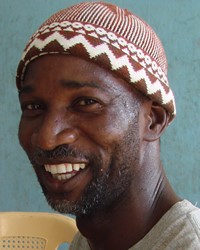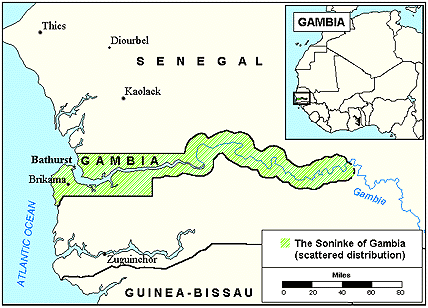One of the first Soninke settlements was established in Ghana around 750 AD. Because of Berber persecution, the Soninke dispersed into small groups within the neighboring regions. The three main offshoots of the Soninke are the Marka, the Nono, and the Aser. Often these tribes are broken into smaller clans that specialized in various crafts. Some of the most important Soninke tribes are the Sisse, the Drame, the Sylla, and the Kante. After fleeing to Senegal and The Gambia, these groups intermixed with the local Wolof, Serer and Malinke tribes.
The Soninke speak a Mandingo language called Sarakole (or Soninke). Sarakole is derived from the Mande language, with dialects of Silabe and Marka. They live all throughout West Africa including the tiny country of The Gambia which straddles the Gambia River, which empties into the Atlantic Ocean. The Soninke have much political power in The Gambia, and Senegal.
In the past, Soninke men throughout West Africa cleared the land and cultivated the crops. The women worked in the gardens. In The Gambia, this pattern is doubtful given it's geography. Today, however, the Soninke have one of the highest rates of labor migration in West Africa. Much of the male population is absent from the home doing migrant work, which often lasts from two to four years. With the women, old men, and children left behind, a form of matriarchal (female-dominated) society has evolved.
The Soninke live in compact villages, in which homes are built in two distinct styles. One style is round huts with brick walls and thatched roofs. Other houses are rectangular, with brick walls, interior courts, and flat terraced roofs. Houses line both sides of the main street. A mosque is typically located at the village square.
There is circumcision for boys when they are in their early teens; this is one way they demonstrate their courage and ability to withstand pain. The Soninke have a high rate of female circumcision, AKA, female genital mutilation.
Soninke marriages require the payment of a bride-price. In contrast to most neighboring tribes, the bride-price is given to the bride rather than her parents and becomes part of her dowry. Pre-marital sexual relations are forbidden. Polygamy (having more than one wife) is generally accepted, with each man being limited to four wives by Islamic law.
In the past, inheritances were passed down from fathers to sons. Today, Muslim rules govern the dispersion of property: one-eighth goes to the widow, while equal shares go to each son, and half shares go to each daughter.
The Soninke eat porridge for breakfast. Lunch is often demba tere and takhaya, two dishes involving rice and peanuts, both of which grow well in West Africa. Dinner is often dere, a stew made with millet and beans. In The Gambia, they probably eat fish as well.
Virtually all of the Soninke in Gambia are Malikite Muslims. Some follow a mixture of various tribal animist religions (believe that non-living objects have spirits).
Islam is a major world religion that is based on the teachings of Mohammed, the prophet. The Koran, or holy book of Islam, was said to have been given to Mohammed by the angel Gabriel. The Soninke follow the five essential "pillars" or duties of Islam: (1) A Muslim must affirm that "there is no god but Allah and Mohammed is his prophet." (2) Five times a day he must pray while facing Mecca. (3) He must give an obligatory percentage (very similar to tithes) on an annual basis. (4) He must fast during Ramadan, the ninth month of the Muslim year. (5) He must try to make at least one pilgrimage to Mecca in his lifetime.
Most Soninke have not heard a clear presentation of the gospel of Jesus Christ. There are Christians among them and among other groups in their region.
Ask the Lord of the harvest to send loving laborers into The Gambia to share Christ with the Soninke.
Ask God to open Soninke ears and hearts to Christian broadcasts and the JESUS Film.
Pray for Soninke elders and family leaders to have dreams of the righteous and all powerful Lord, opening them to the gospel.
Pray for Soninke people to have the spiritual hunger it takes to embrace Christ no matter what the cost.
Pray that God will give Soninke believers boldness to share Christ with their own people.
Scripture Prayers for the Soninke in Gambia.
https://en.wikipedia.org/wiki/Soninke_people
| Profile Source: Joshua Project |












